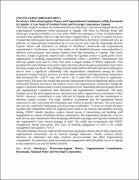| dc.description.abstract | OWONA JAMES (2008-M102-20071)
Herzberg’s Motivation-hygiene Theory and Organisational Commitment within Parastatals in Uganda: A Case Study of National Water and Sewerage Corporation, Uganda
This study sought to examine the relationship between Herzberg‟s motivation-hygiene theory and organisational commitment within parastatals in Uganda with focus on National Water and Sewerage Corporation (NWSC) as a case study. NWSC has undergone a series of transformation initiatives that embodies aspects of the motivation- hygiene theory. A review of related literature revealed that both hygiene factors and motivators as identified in Herzberg‟s framework have an influence on organisational commitment but it is not exactly clear what the relationship between hygiene factors and motivators as defined in Herzberg‟s framework and organisational commitment is. Furthermore, many of the studies in the identified literature were undertaken in different socio-economic and cultural contexts from that prevailing in Uganda. This study, therefore, sought to generate empirical data within the Ugandan context to guide public sector organisations in building organisational commitment within a workforce. Questionnaire and interview guides were used to collect data from a sample number of NWSC employees. This permitted the study findings to be used to make inferences about the general population from which the study sample was drawn. Key findings from the study indicate that both motivators and hygiene factors have a significant relationship with organisational commitment among the study population. Hygiene factors, however, are much more correlated with organisational commitment than motivators (R= .238; P value .002 and R= .56; P value .000 at 0.01 level of significance respectively). The study also reveals that personal characteristics have no significant impact on the relationship between motivators and hygiene factors and organisational commitment though the impact of personal characteristics is more pronounced on the relationship between hygiene factors and organisational commitment than motivators and organisational commitment. The study findings reveal that both hygiene factors and motivators affect organisational commitment within NWSC. However, commitment is more affected by hygiene factors and this commitment is, therefore, mainly extrinsic. The study, therefore, recommends that the organisation should endeavour to carry out formal job evaluations and reviews at specific intervals. This will ensure that jobs are continually challenging and motivating to jobholders. A survey of related literature revealed that commitment driven by hygiene factors tends to be extrinsic and therefore not long lasting. NWSC should, therefore, explore formal means of determining and building staff engagement as a means of building intrinsic commitment. The organisation should also carry out staff surveys and consultations when designing staff benefits packages and regularly communicate the organisation‟s total reward package to staff. The study also recommends that NWSC management should particularly seek ways of building engagement of staff in the middle management line (grades 5-7) 114
The study findings, however, indicate that motivators and hygiene factors do not fully explain how organisational commitment can be fostered amongst employees. Further research should, therefore, be undertaken into other retention factors/variables that affect organisational commitment. An exploratory study into employee engagement within the public sector in Uganda is also proposed as an area for further research.
Key Words: Herzberg’s Motivation-hygiene Theory, Organisational Commitment, Parastatals, National Water and Sewerage Corporation. | en_US |


